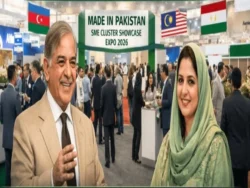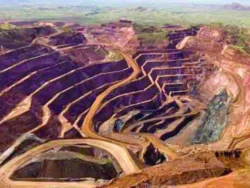Economic fallout of political crisis

26 February 2024
Published in: Pakistan Observer
Pakistan’s strategic location at the crossroads of Asia, with China, India, and Iran and Afghanistan, makes it an important trade, energy, and transport corridor. It serves as a gateway to energy-rich Central Asia, Gulf States, and far Eastern countries. Pakistan ranks 27th in purchasing power parity and 46th in nominal GDP, and is 8th among the top 10 recipients of remittances. Major sectors include Agriculture, Industrial, and Services, contributing 19%, 20%, and 61% respectively to GDP. Pakistan is also a resource-rich country with abundant reserves of coal, gas, gemstones, copper, salt, minerals, gold, oil, iron, and aluminium, essential for any growing economy. With such immense potentials, the country has been plagued by persistent political and economic crises that have hindered its growth and development. Pakistan has a tumultuous history marked by periods of democratic governance and military rule. The recurring cycle of political instability has impeded progress and hindered the nation’s ability to fully realize its potential. Understanding this historical context is crucial to address the root causes of the political crisis. The current political landscape in Pakistan is marred by a series of challenges. Weak governance, political polarization, and electoral issues have eroded public trust and hindered effective governance. Poverty and income inequality remain pervasive issues in Pakistan. A significant portion of the population lives below the poverty line, hindering social and economic progress. Focused policies on poverty alleviation and bridging income disparities are vital for inclusive growth.
Corruption remains a pervasive issue in Pakistan, deeply intertwined with the political crisis. High-profile corruption scandals and a culture of impunity have further exacerbated the problem. The nexus between corruption and political instability must be recognized to develop effective solutions. Corruption not only erodes public trust in institutions but also diverts essential resources away from critical public services and development projects. One of the many pressing economic challenges in Pakistan is the energy crisis. Frequent power outages and energy shortages have stifled industrialization and economic growth. The energy sector requires substantial reforms to ensure uninterrupted supply and efficiency. Attracting foreign investment is crucial for economic growth and Pakistan still faces challenges in providing a conducive environment for investors. Overcoming economic crises in Pakistan is a complex task that requires a combination of short-term and long-term strategies. To achieve this, Pakistan can implement macroeconomic stability through fiscal discipline, monetary policy, structural reforms, infrastructure development, diversification, investment in human capital, export promotion, social safety nets, foreign aid and investment, debt management, energy sector reforms, agricultural modernization, support for small and medium-sized enterprises (SMEs), collaboration and consensus, long-term planning, innovation and technology, and environmental sustainability. Fiscal discipline involves implementing prudent fiscal policies to reduce budget deficits and control government debt. Monetary policy ensures stable inflation and exchange rates by maintaining an independent central bank. Infrastructure development involves investing in infrastructure projects to facilitate economic growth. Diversification promotes different industries, such as technology, manufacturing, and services, reducing reliance on a single sector. Investment in human capital, education, healthcare, and export promotion can improve workforce skills and productivity. Collaboration and consensus on economic policies are essential for effective implementation and withstand political changes. Long-term planning involves developing a comprehensive economic development plan, investing in research and development, and considering sustainability in economic development plans.
Building strong democratic institutions, including the parliament, judiciary, and election commission, is essential. These institutions must be empowered to act independently and impartially. Pakistan’s political and economic crises are multifaceted challenges that demand a comprehensive strategy for resolution. By addressing political instability, corruption, and economic vulnerabilities while strengthening institutions and fostering international cooperation, Pakistan can chart a course toward stability and prosperity. The passion and potential within Pakistan’s society, combined with strategic reforms, can pave the way for a brighter future. An independent judiciary is the cornerstone of upholding the rule of law. Ensuring the judiciary’s autonomy and effectiveness is vital for addressing corruption and ensuring justice. Challenges within the civil service system, including bureaucracy and inefficiency, need to be addressed through modernization and capacity-building measures. A more responsive and efficient civil service can facilitate effective governance. Engaging with the international community and leveraging international partnerships for economic growth is critical. Collaborating with global organizations and donors on development projects can provide much-needed resources and expertise.
Political crises can be addressed by adopting strategies include promoting dialogue and reconciliation, strengthening democratic institutions, fighting corruption, implementing economic reforms, investing in education and healthcare, strengthening the rule of law and security, promoting media freedom and freedom of expression, engaging in regional and international cooperation, involving the public in decision-making processes, and considering political reforms.
It is crucial to ensure the independence and effectiveness of key democratic institutions, promote transparent elections, and fight corruption through robust anti-corruption measures. Economic reforms should be implemented to stimulate growth and reduce poverty. Investing in education and healthcare can improve quality of life and reduce socio-economic disparities. Pakistan offers the best demographic prospects for growth as an increasing number of its youth are reaching adulthood.
Achieving sustained economic growth will be aided by the growing share of Pakistan’s youth bulge with a variety of skills. Strengthening the rule of law and security, promoting media freedom, and promoting international cooperation can also help. Public engagement and political reforms should be considered to ensure broader political participation and representation.





